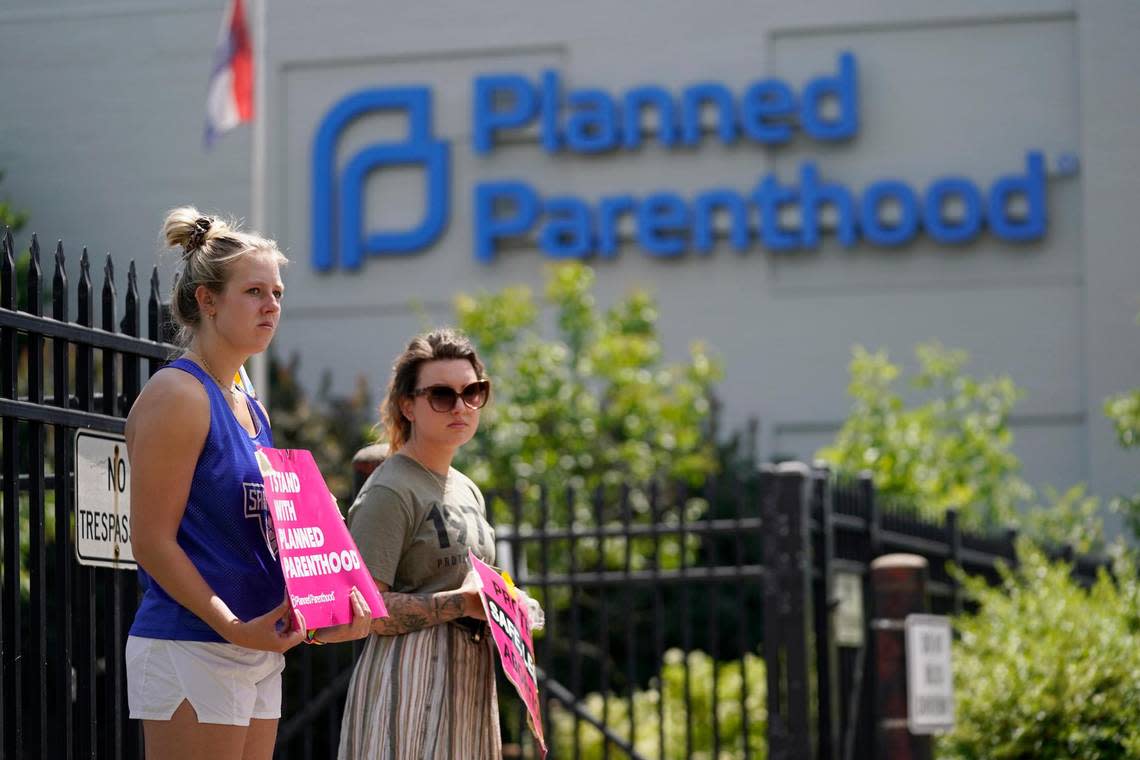Are neighboring states driving abortion demand in Kansas after Supreme Court decision?

Within minutes after the U.S. Supreme Court announcing its overturn of Roe v. Wade, Missouri had banned abortion.
But the reality of abortion access in the Kansas City region hasn’t really changed that much so far.
Since 2018 the only abortion clinic in Missouri was in St. Louis. For more than three years, Missouri women in the Kansas City metro who wanted or needed an abortion were most likely to seek care at the two clinics in Overland Park, Kansas.
As a result Missouri women in 2021 accounted for 44% of the abortions in Kansas in 2021.
The overturning of Roe v. Wade didn’t change that.
Anamarie Rebori-Simmons, a spokeswoman for Planned Parenthood Great Plains, said the organization’s Overland Park clinic saw increased call volume in the days and weeks after the U.S. Supreme Court overturned Roe v. Wade, but the overwhelming majority of patients were still from Kansas and Missouri.
“Missouri was Texas before Texas was Texas,” Rebori-Simmons said. “I think people may not have realized how limited to nonexistent abortion care was in the state of Missouri for several years prior to the Supreme Court decision.”
Kansas’ southern neighbor Oklahoma has also banned abortion, in addition to Missouri. There are only four abortion providers in Kansas– two in Wichita and two in Overland Park.
However, even as they receive more calls from patients in the surrounding region, Kansas providers say appointments remain limited. Furthermore, Kansas has restrictions on the books - like a 24-hour waiting period - that may make it less convenient to patients traveling from other states compared to states with more permissive regulations and more clinics.
“We haven’t changed how many health centers and providers there are across the whole state. And there are so few, it’s like the reality doesn’t meet the fact that much of our surrounding states have lost access,” Rebori-Simmons said. “I think people are looking at New Mexico and Colorado, in addition to Illinois.”
The chief medical officer for Planned Parenthood in the St. Louis region told the Senate Judiciary Committee last week that the organization’s clinic in Fairview Heights, Illinois saw appointments triple after the decision.
In the lead-up to Kansas’ Aug. 2 vote on a constitutional amendment to remove the state-level right to an abortion, much of the debate has centered on Kansas’ role in the regional abortion access apparatus.
“The Value Them Both amendment would stop us from becoming a destination state with no health and safety standards in the clinics operating here,” Danielle Underwood, a spokeswoman for Kansans for Life, said at an anti-abortion event earlier this month.
The Guttmacher Institute, an abortion rights research group, published a study last year that Kansas would see a more than 1,000 % increase in women of reproductive age whose would find their closest abortion clinic in the stat if the Supreme Court overturned Roe v. Wade.
The statistic was recently removed from Guttmacher’s website. A spokeswoman said it was no longer accurate.
“It was based on the assumption of the whole group of 26 states all banning abortion at the same time, and that is not what is happening at the moment, where we are seeing a very fluid and chaotic situation,” a Guttmacher spokeswoman said in an email.
But before its removal the stat was used by the Value Them Both Coalition, the primary organization advocating for passage of the Kansas amendment, as evidence that the state could see a 1000% increase in abortions if the right to an abortion remained in the state constitution.
The Star also cited the data in a report that incorrectly framed the population figure as a projection of increased demand. The article has since been updated to clarify this point.
According to Kansas’ abortion providers, geographical proximity to Kansas has not universally resulted in a woman coming to the state for an abortion and the existing clinics do not have enough appointments to serve the number of patients seeking abortions in the region.
Zack Gingrich-Gaylord, a spokesman for the Trust Women Clinic in Wichita, said the clinic received about 500 calls daily after Texas instituted its six week ban last year. After the decision came in the clinic has gotten 1,000 calls some days.
“We cannot answer that many phone calls,” Gingrich-Gaylord said. When potential patients do get through, the clinic is only scheduling two weeks in advance. If they’re booked they tell patients to call back at the beginning of the week, or to try another state.
But the clinic has not been able to meaningfully increase the number of patients they serve, he said. The clinic had undergone renovations to prepare for increased demand but the process was delayed and hadn’t finished by the time the decision came down.
“If we get to the point where we are now where you have 13 that immediately banned and we’re seeing more and more bans come to fruition, at what point are there just no more availabilities,” Gingrich-Gaylord said.
“That’s where we are.”